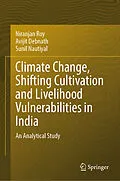This book explores how climate change affects households that rely on shifting cultivation and how to assess their vulnerability. This study looks at micro and macro levels in Indian states with indigenous communities practicing shifting cultivation. The micro-level study has been conducted in 52 villages, with 1469 households covering 7067 population in seven states of India in the Northeastern region. The book covers different topics related to climate change, such as its patterns, impact on households and agriculture, forest management, and the role of indigenous knowledge in mitigation. This research is associated with different sectors like shifting agriculture, forestry sector, climate change and rural development etc. and integrated with large respondents and stakeholders through both direct and focus group discussions. Research scholars, climate activists, institutional and non-institutional organisations, people interested in environmental science, social science and policymakers will find this book very relevant.
Autorentext
Dr. Niranjan Roy is a Senior Professor in Economics, Assam University (A central University), India and also the Director, Centre for Studies in Human Development (CSHD) Assam University. He is a distinguished academician specialised in environmental economics, climate change, regional studies and social sector issues. His publications include 12 books (both edited and references) and many research papers and articles in international and national journals.
